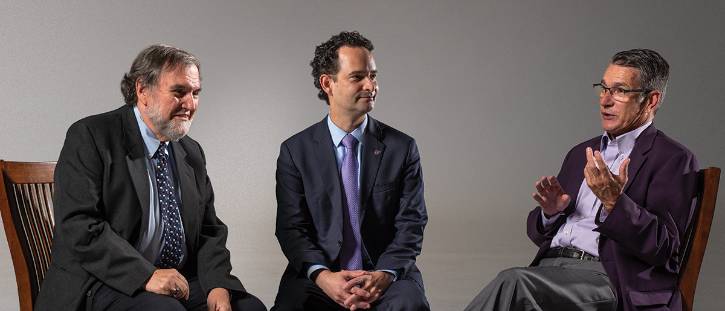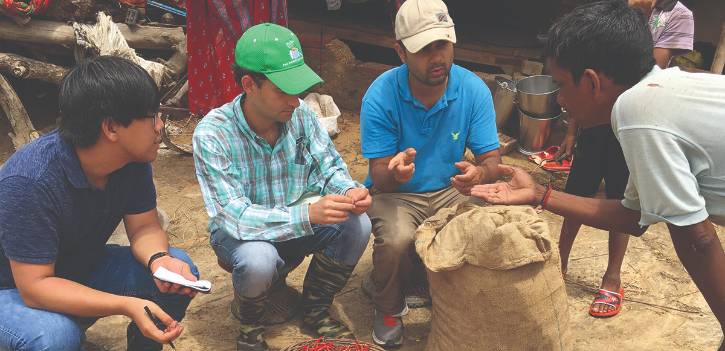Collaboration for a safer global breadbasket

A Kansas State University team and collaborators are addressing food supply contamination in Nepal.
Jagger Harvey, director of the K-State Feed the Future Innovation Lab for the Reduction of Post-Harvest Loss, funded by the U.S. Agency for International Development, and several collaborating institutions recently finished a two-year project in Nepal.
The study found fungal toxins in several major food crops, including peanuts, corn, soy nuggets and chili peppers. Along with other partners, the Nepal Development Research Institute, the Nepal Academy of Science and Technology, and Helen Keller International led key components of the project, which established national capacity to address mycotoxin contamination in the food system. Jisang Yu, assistant professor of agricultural economics in the K-State College of Agriculture, led agricultural economics efforts.
“Twenty-five percent of Nepalese children are below the second percentile for growth on an international scale and a portion of this growth stunting is potentially attributed to naturally occurring mycotoxins in the food supply,” said Harvey, also a research associate professor of plant pathology in the College of Agriculture. “In one region, previous work found 95% of pregnant women tested positive for exposure to aflatoxins, a category of mycotoxins.”
To help Nepal plan a mitigation strategy, Harvey invited John Leslie, university distinguished professor of plant pathology in the College of Agriculture, to help host a multisectoral stakeholder workshop using the nominal group technique. Leslie has 30 years of experience leading workshops that use this discussion technique and has helped other developing countries with comparable issues.
According to Harvey, the nominal group technique helps stakeholders become invested in solving problems and helps guide their efforts. It works by dispersing people from a variety of backgrounds to formulate relevant local solutions to complex, multifaceted problems.
“The goal is to allow individuals to express what they see as a priority to solve the problem,” Leslie said. “It’s very democratic and in the end, you get both an excited and very empowered group and a diverse list of action items for addressing the problem.”
Nepal now has a wet lab for food and feed mycotoxin testing and research to support the national planning and mitigation measures to remediate this food safety issue.

Collaboration and communication
Communicating across all entities is key in addressing food security. During the Nepal workshop, Jeff Morris, K-State vice president for communications and marketing, addressed the multiple difficulties of relaying scientific information to a general public without misconceptions that can cause irrational public concern and economic loss. As a result of this presentation, Morris and Leslie created a framework for communication about food security issues and published it in the December 2019 issue of Frontiers in Sustainable Food Systems.
Partners
The collaborative project in Nepal involves numerous researchers, leaders and organizations.
USAID Nepal Mission and BFS
Ahmed Kablan, Debendra Adhikari and colleagues
Kansas State University
Jagger Harvey: lead
John Leslie: mycology
Jisang Yu: mycotoxin, agricultural economics
Dena Bunnel, Caroline Kolins and Catherine Hickman: planning and support
University of Nebraska-Lincoln
Andreia Bianchini and team: mycotoxin/mycology analysis, capacity building
Nepal Development Research Institute
Jaya Gurung and team: survey design and implementation, lab establishment, sample analysis, policy linkages, in-country lead
Helen Keller International
Dale Davis and team: survey implementation lead
Nepal Academy of Science and Technology
Jaishree Sijapati and team: mycotoxin laboratory establishment and hosting, shared research capacity
CSIRO Australia
Ross Darnell: modeling, sampling, stats
Nutrition Innovation Lab
Patrick Webb, Shibani Ghosh, Robin Shrestha, Joanna Andrews-Trevino and team: diet-exposure/stunting association
Mars Global Food Safety Center
Bob Baker, Guangtao Zhang, Abigail Stevenson and team: collaborations on lab design, capacity building, research, intervention identification and funding
ISPA
Antonio Logrieco and team: multi-mycotoxin/mycology analysis, pilot snapshot
Romer China: mycotoxin kit and equipment donation, technical information
Tribhuvan University
KC Gopal and Ram Kumar Shrestha: research and capacity building
Broader stakeholder group:
Sabnam Shivakoti, Matina Baidya and Krishna Rai, colleagues at NARC, Plant Quarantine, Ministry of Agriculture, Ministry of Health and others
